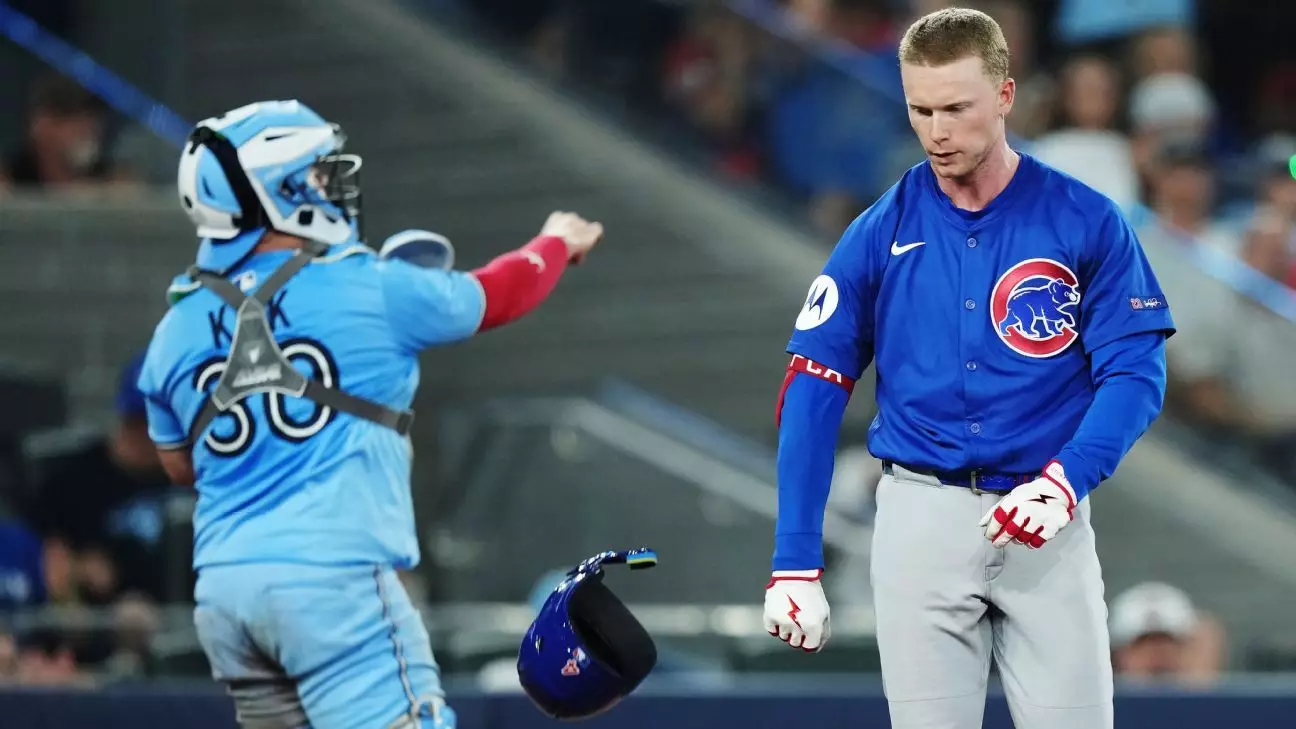Baseball is a game of ebbs and flows, yet facing a prolonged slump can test even the most seasoned teams. The Chicago Cubs find themselves in such a storm, suffering a three-series losing streak for the first time this season — a stark contrast to their earlier dominance. The team’s recent struggles, particularly in offensive production, threaten their postseason ambitions. Despite the discomfort that comes with losing, the Cubs’ management preaches patience and perseverance, emphasizing that a focus on process over immediate results is their best path forward.
In contemporary sports culture, there’s a tendency to overreact to downturns, often labeling the team as “slumping” or “struggling,” which can perpetuate a cycle of negativity. But the Cubs’ approach seems rooted in deeper wisdom: acknowledging that setbacks are inevitable, but how a team responds can define its resilience. Manager Craig Counsell’s comments reflect this philosophy, urging players to stick to their routines and trust their skills without succumbing to the pressure of immediate outcomes.
The Offensive Drought and Its Complex Roots
Since the All-Star break, Chicago’s offensive stats tell a cautionary tale. Dropping from the top-tier of the league to 28th in runs scored signals more than just bad luck — it reveals underlying challenges. Multiple key contributors, from Kyle Tucker to Seiya Suzuki, have seen their production decline markedly. Tucker’s dip to a .195 batting average since July 1, along with just one home run, exemplifies how streaks can stifle a team’s offensive rhythm.
It’s tempting to pinpoint a single trigger for this downturn, but the reality is more nuanced. Injuries, slumps, and psychological pressure interplay, creating a mosaic of issues that cannot be neatly attributed to one factor. For instance, Tucker’s finger injury in June was a tangible setback, but his subsequent struggles go beyond just physical limitations. Likewise, other core players like Suzuki, Busch, and Happ are experiencing reduced output, hinting at a collective slump rather than isolated failures.
This widespread dip hints at a broader mental and technical hurdle. Baseball, with its highly individualistic yet team-dependent nature, requires confidence and rhythm. When these elements falter, momentum can evaporate quickly, deepening the sense of collective frustration.
Psychological Resilience: The Key to Turning Things Around
Amidst these struggles, conversations like Pete Crow-Armstrong’s reveal the importance of mental fortitude. His acknowledgment of internal pressure and the desire to “produce again” highlight a critical aspect of sports performance: resilience. Understanding that setbacks are temporary and maintaining faith in one’s abilities is vital to reversing a downturn.
Crow-Armstrong’s perspective touches on a powerful truth— that mental resilience often determines the trajectory of a team’s season. It’s not enough to have talent; players must also possess the psychological grit to persevere through adversity. The Cubs’ management seems to recognize this, emphasizing consistent effort and process-focused thinking over results. They understand that results are a byproduct of effort, preparation, and mental strength, not just raw talent.
Likewise, Counsell’s insistence on sticking to fundamentals and trusting the process is essential. Baseball isn’t an instantaneous game; it rewards consistency and patience. Successful teams are built on a foundation of resilience, where failures are seen as learning opportunities rather than definitive setbacks.
Strategic and Cultural Opportunities for Recovery
For the Cubs to turn their fortunes around, they must navigate multiple dimensions simultaneously. Offensively, a combination of strategic adjustments — such as refined approach at the plate, focused training, or even lineup tweaks — could reawaken their dormant power. Mentally, fostering a culture where players embrace challenges without undue self-imposed pressure is equally crucial.
The team’s current standing in the wild-card race suggests they are still very much in the chase, despite the division slipping away. Maintaining this slim margin of hope requires a dual focus: addressing technical flaws and nurturing mental resilience. While the Brewers and Reds are performing well, the Cubs’ stability in not being swept in series indicates an underlying toughness that can be harnessed for a comeback.
Furthermore, leadership within the clubhouse can catalyze this resurgence. When players like Crow-Armstrong and others vocalize their intent to continue playing their traditional game, they set the tone for collective resilience. Their attitude underscores a vital message— adversity is temporary, and perseverance is what defines champions.
The opportunity lies in harnessing the lessons learned from hardship. Players and coaching staff alike must internalize that setbacks are part of the game’s fabric; what matters most is how they respond. A focus on executing fundamental skills, supporting one another emotionally, and maintaining a long-term vision can provide the strategic leverage needed for a turnaround.
The Chicago Cubs are at a pivotal juncture where their internal strength will play a decisive role in their future. Success is not solely dependent on fixing mechanics or adjusting tactics; it requires fostering an unshakeable mindset of resilience and trust. This moment, filled with difficulty, also offers an opportunity to reinforce their identity — not just as talented players, but as a team capable of overcoming adversity through grit, patience, and unwavering commitment to their process.
As fans and analysts scrutinize every swing and pitch, the true challenge lies within the clubhouse. The Cubs’ ability to embrace setbacks as a natural part of the journey, rather than insurmountable obstacles, could ultimately determine whether they rally back into postseason contention or allow their struggles to define them. Resilience, in baseball as in life, is often the secret ingredient that transforms temporary setbacks into long-term triumphs.


Leave a Reply